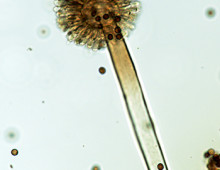Waddell, who was presented the honorary degree, doctor of humane letters, was one of six people to receive honorary degrees at this year’s commencement ceremonies. The others were economics scholar and international adviser to political leaders Padma Desai, doctor of laws; Vermont’s long-serving senator, Patrick Leahy, doctor of laws; local volunteer and activist Dorothy Bigelow Neuberger…
Fungal lessons for large-scale “green” chemical production
The chemical compound citric acid has been produced on a large-scale basis for decades with the help of the filamentous fungus Aspergillus niger. The fungus also has enzymes that can be used to help break down plant cell walls for biofuel production, and it plays a key role in the carbon cycle. Aspergillus niger (Sue…
DOE JGI microbes on space shuttle Endeavour per Wired UK
there are also some other passengers on the shuttle, who might not receive the same media attention, sew-on patches and victory parades. Alongside the all-male crew of mission STS-134, six types of microorganism and a bobtail squid will strap in their seat-belts and head into space. Read more in Wired UK but head for the DOE…
Maize genomics at DOE JGI User Meeting in Genome Technology
Speaking at the Department of Energy Joint Genome Institute’s sixth annual User Meeting, held in Walnut Creek, Calif., in March, Buckler said that while they may not have realized it at the time, maize breeders in Thailand, Mexico, and elsewhere have, since the turn of the 20th century, captured a great deal more genomic diversity…
Eucalyptus genome sequence in ScienceDaily
According to Prof Myburg, these scientists, as well as countries with commercial eucalypt plantations will be the primary beneficiaries of the genome sequence now available on the Internet (http://www.phytozome.net/eucalyptus.php). The Eucalyptus research community will continue to add value to the genome sequence in order to make it more accessible to the broader scientific community. Publication of the…
Spikemoss genome aids biofuels researchers and botanists
The genome of a small plant is providing biofuels researchers with information that could influence the development of candidate biofuel feedstock plants and offering botanists long-awaited insights into plant evolution. Published online May 5, 2011 in Science Express, a team of researchers including DOE JGI’s Dan Rokhsar and Igor Grigoriev used a comparative genomics approach on…
Same Fungus, Different Strains: A Comparative Genomics Approach for Improved “Green” Chemical Production
WALNUT CREEK, Calif.—Fungi play key roles in nature and are valued for their great importance in industry. Consider citric acid, a key additive in several foods and pharmaceuticals produced on a large-scale basis for decades with the help of the filamentous fungus Aspergillus niger. While A. niger is an integral player in the carbon cycle,…
Tringe DOE Award in BioPortfolio
DOE’s Office of Science awarded the Early Career Research grant to Susannah Green Tringe, a researcher in the Lawrence Berkeley National Laboratory’s Genomics Division, to study how microbial communities in restored wetlands may impact long-term carbon sequestration, from a genomic perspective. Read more in BioPortfolio
Eucalyptus genome in FirstScience News
A team of international researchers, led by Prof Zander Myburg from the Department of Genetics and the Forestry and Agricultural Biotechnology Institute (FABI) at the University of Pretoria (UP) – in collaboration with the US Department of Energy (DOE) Joint Genome Institute (JGI) – making available the complete genome sequence of the forest tree species, Eucalyptus…
Tringe DOE Award in GenomeWeb
DOE’s Office of Science awarded the Early Career Research grant to Susannah Green Tringe, a researcher in the Lawrence Berkeley National Laboratory’s Genomics Division, to study how microbial communities in restored wetlands may impact long-term carbon sequestration, from a genomic perspective. Read more on GenomeWeb

